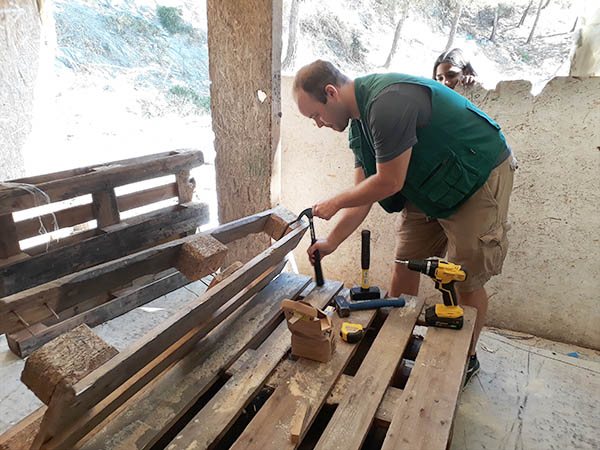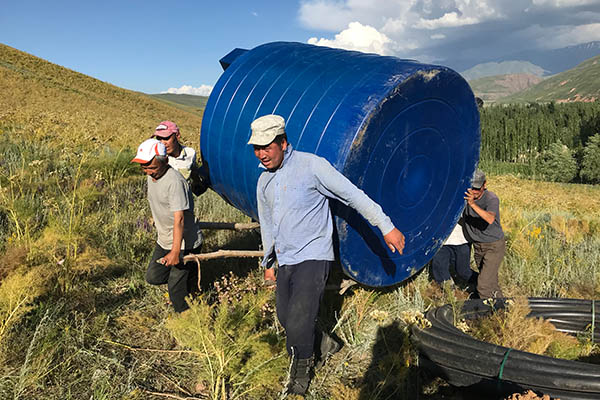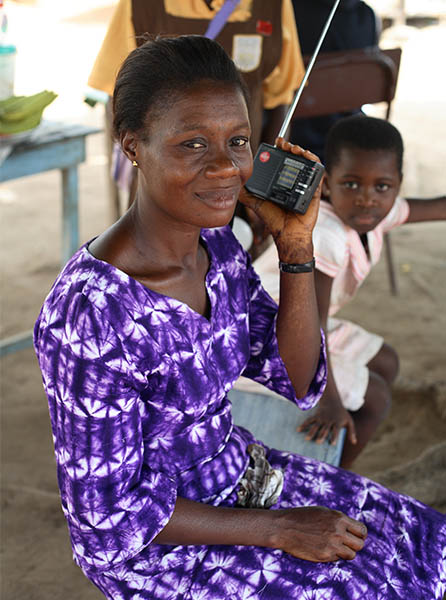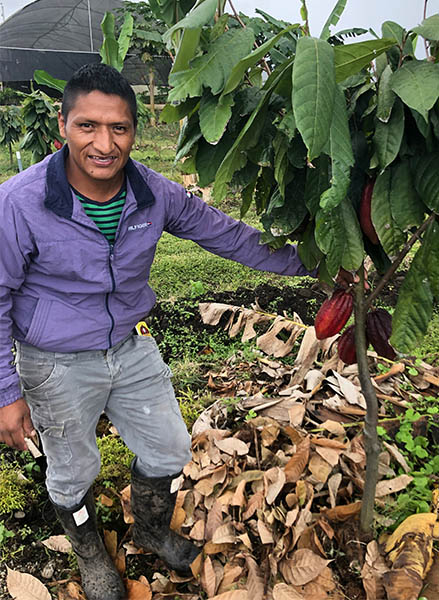Off the coast of the island of Lesbos in Greece, there is a mountain of discarded life jackets, representing the thousands of asylum-seekers who have arrived by boat from countries like Afghanistan, Syria, Iraq, Iran and Somalia. They flee war, violence and persecution in search of a better future.
But what they find is an overcrowded refugee camp, a temporary shelter in a country that doesn’t want them, and a shortage of water, food, sanitation and safety. Moria, the largest of the refugee camps on Lesbos, was built to hold 3,100 refugees, but it is now overwhelmed with more than 13,000 people. The Christian NGOs that support the Greek government by processing new arrivals are given one rule: do not turn anyone away.
 Reach Beyond has been taking groups to serve in Moria since the spring. The teams help with food distribution and small construction projects, while meeting with other agencies to explore potential partnerships.
Reach Beyond has been taking groups to serve in Moria since the spring. The teams help with food distribution and small construction projects, while meeting with other agencies to explore potential partnerships.
At one point, a refugee approached one of our missionaries and asked, “Are you a Christian?” It is illegal to proselytize in the refugee camp, but our missionary answered the question honestly, to which the refugee responded, “Why else would you be here?”
Just the act of showing up and serving a felt-need helps people to see Jesus.
“In the same way, let your light shine before others, that they may see your good deeds and glorify your Father in heaven.” Matthew 5:16 (NIV)
FOLLOWING THE EXAMPLE OF JESUS
The tagline for Reach Beyond is “Voice + Hands, Together.” The word "Together" is important. We do mission in partnership, together with others. But we also do our voice and hands strategies together.
You can't truly proclaim the Gospel without also demonstrating it. Words without deeds are empty. It is hard to hear and accept a message of salvation until the more immediate physical needs are met. On the flip side, if you heal the body without also healing the soul, what was the point?
As one of our medical missionaries says, “We have the technology to improve someone’s life, to heal them, to even bring them back to life if their heart stops. But, if we bring them back physically and leave them dead spiritually, we actually did very little.”
We do missions with a holistic approach. Matthew 9:35 (NIV) tells us that Jesus “went through all the towns and villages, teaching in their synagogues, proclaiming the good news of the kingdom and healing every disease and sickness.” He did both.
Reach Beyond has a long history of proclaiming and demonstrating the Gospel, together. Reach Beyond started as HCJB Radio in 1931, but by 1949, medical professionals had joined the team to also address the physical needs of the people. Today, we continue to leverage our strengths in media, medicine and community development so that unreached people everywhere can hear about Jesus, see Him in action and learn how to follow Him.
WHAT IS COMMUNITY DEVELOPMENT?
The United Nations defines community development as "a process where community members come together to take collective action and generate solutions to common problems." Community development can happen within a community, or with outside help, but it is important that the outside help come with a learner posture, ready to engage with the community to help address their felt-needs together.
 There are as many expressions of community development as there are people working toward creative solutions. It can include, but is not limited to, medicine, clean water and sanitation, construction, agriculture, emergency relief, business as mission, teaching, and English as a second (or another) language.
There are as many expressions of community development as there are people working toward creative solutions. It can include, but is not limited to, medicine, clean water and sanitation, construction, agriculture, emergency relief, business as mission, teaching, and English as a second (or another) language.
While there are many secular organizations providing for these needs, a mission organization is the only one that can truly treat the whole community – physically, emotionally, mentally and spiritually. Only Jesus can bring full healing. Holistic evangelism is a long game, coming alongside a community to build trust and bring total healing.
“When you are going to love someone, you love them all the way, and not just with a short-term fix,” says Roger Basick, VP of International Ministries at Reach Beyond. “It isn’t just about the project. We truly try to see what they need and help them help themselves. This is the difference between just installing a well or sending a missionary with a water engineering background. We are in it for the long haul.”
INVESTING IN SYSTEMIC CHANGE
In the former Soviet Union, Reach Beyond missionaries have been working for years to build trust with local people groups by learning their languages, living among them, and identifying the felt-needs of the region.
One particular country struggles to provide adequate healthcare to its people. Medical protocols are nearly 50 years outdated, and people still rely on traditions and superstitions to “treat” different disorders. There is little incentive to become a doctor (even taxi drivers are paid better), and those who do get training often times choose to leave their country to practice where the standards of living are higher.
One of our missionary doctors (whose name must be withheld for security) has worked with a local partner to make systemic changes to the country’s medical training and practice. Under Soviet control, people did not go to family practice doctors, but rather only saw specialists. When a person is only seen by doctors who specialize in one part of the body, they are not able to get holistic treatment. It leads to higher medical costs, unnecessary tests and treatments, and misdiagnosis.
Our doctor established a family practice clinic in the city, and began working with our partner to train other doctors, and increase awareness of the benefits of family practice medicine. The clinic employs Christian doctors, however since evangelism in the country is illegal, the doctors have to witness through how they live their lives, and treat their patients. They have done such a good job, the government has designated the clinic as one of the official residency programs. Their work has helped change the perspective of family practice medicine in the country. They are now looking at opportunities to expand the clinic model in nearby communities, with missionary doctors working side-by-side with local family practitioners.
Recently, over 300 medical students, family medicine residents and family medicine doctors from around the country participated in the country’s annual Family Medicine Day Conference. A team from the U.S. presented workshops on a variety of topics, and at the end of the conference, everyone came together for a dinner. One of our doctors said that the most moving part of the conference came when the residents in attendance stood and thanked the foreigners for their participation.
“One of the residents stood and sang a song for us, an adapted version of the song, ‘Wind of Change’ originally sung by a German band in 1991. The song was written to describe the changes that were happening in the world as the Berlin Wall came down, and the Soviet Union with it,” he said. “For these young doctors, however, the ‘wind of change’ refers to the latest healthcare reforms in their country, which emphasize family medicine as the foundation of the public health system and the key to providing access to healthcare for all citizens. Salaries are being increased and training programs are being decentralized, to encourage new doctors to go and work where they are most needed. And the young people are excited by this wind of change.”
He continued, “But there is another ‘wind of change’ that the staff of our clinic are praying for. It is described in Acts 2:2. May that wind blow ever stronger in this region!”
 REMOVING THE OBSTACLES
REMOVING THE OBSTACLES
Sometimes God only opens a door for either media or community development ministry. There are some places we cannot send missionaries, but we can still broadcast the Good News across borders. In other places, we may not be able to proclaim the Gospel freely, but we can send skilled workers, like doctors and engineers.
As a radio ministry, Reach Beyond is able to broadcast the Good News of the Gospel into the homes of unreached people groups. But what happens when the communities we want to reach do not have electricity? How can they hear the Good News?
That question inspired Reach Beyond Australia to launch the “Light Up a Village” project. “Light up a Village” is an on-going project which provides solar panels, LED lights and shortwave radios to people in remote and rural villages throughout the Asia Pacific region, with a particular focus on India. The need is great. Over 700 million people in India alone do not have reliable access to electricity. They are forced to live in darkness.
“'Light Up a Village' will not only bring natural light to millions of people, but spiritual light too,” says Dale Stagg, CEO of Reach Beyond Australia. “It will reach unreached people groups and those who have limited access to the Gospel.”
The project works by placing a solar panel with multiple charging ports in each village, including LED lights and robust portable shortwave radios. The LED lights have a small battery like those in mobile phones. The villagers recharge their batteries during the day so they can use them at night. A 20-minute charge will provide light for up to 8 hours.
“By packaging a shortwave radio with a light, we are able to give them two things: the message of hope--spiritual light, and the benefit of natural light. Effectively, an entire village is ‘lit up’ and can hear the message of Christ,” says Dale.
PLANTING SEEDS, SOMETIMES LITERALLY
The Bible uses many agriculture metaphors. Jesus gave us the parable of the farmer who scattered his seed among the path, the rocky ground, the thorns and good soil. He calls the seed the “Word of God.” Paul says we are fellow workers with God, planting seeds and watering, while God makes it grow, and bear fruit.
As a mission organization, we plant seeds of spiritual truth through our media ministry and interactions with unreached people. But, sometimes we plant literal seeds, too. Agriculture is another way we can come alongside and help improve a community. It also happens to be a tool with a great metaphor.
In 2017, Reach Beyond launched a greenhouse project in Shell, Ecuador to grow cocao beans, oranges and vegetables, in order to reach people groups living among the Amazon rain forest east of Shell. The produce can help people improve their diet, and provide them with a new source of income.
 Reach Beyond's greenhouse outreach came in response to a failed agricultural program which flew in thousands of cocao trees to remote jungle villages to help boost people's incomes. Well-intentioned, the effort was not accompanied by training on keeping plants alive amid the region’s drenching rains.
Reach Beyond's greenhouse outreach came in response to a failed agricultural program which flew in thousands of cocao trees to remote jungle villages to help boost people's incomes. Well-intentioned, the effort was not accompanied by training on keeping plants alive amid the region’s drenching rains.
“In our community development mindset, we saw a niche that we could fill and do some training,” said Wim de Groen, a Reach Beyond missionary. “We can help the people learn how to take care of the plants, and we can help educate them on how to grow the plants better and faster.”
Staff members provided weekly training to villagers initially on how to grow the trees. Eventually, the plants were distributed to remote areas. As the trees matured, they were better able to tolerate the torrential downpours in the rainforest.
The project has since delivered thousands of cocao trees to many communities and individual families living in the jungle. The project is now managed by Pedro, a local believer who is passionate for Jesus and runs the project as a business as mission model. Reach Beyond works alongside Pedro to impact the communities through training and teaching. The project is a thriving ministry, with an end goal of more than just growing trees.
“Our desire is that we can see changes in people’s hearts—changes on the inside,” added de Groen. “Although we hope to help a number of communities with planting projects, we want to see the fruits of a change from within.”
Agriculture opportunities go beyond Ecuador. In Spain, Reach Beyond has partnered with a local pastor who established a hydroponics project to support refugee communities. In Africa, we have a partner interested in planting fruit trees, to help push back the advancing Sahara Desert. These projects, and many more, provide a way to support the local communities we hope to reach.
As Reach Beyond continues to develop strategies for reaching unreached people throughout the world, the tools will include every expression of media, healthcare and community development. We want people to hear about Jesus, see Him in action, and learn how to follow Him. Voice + Hands, Together.
